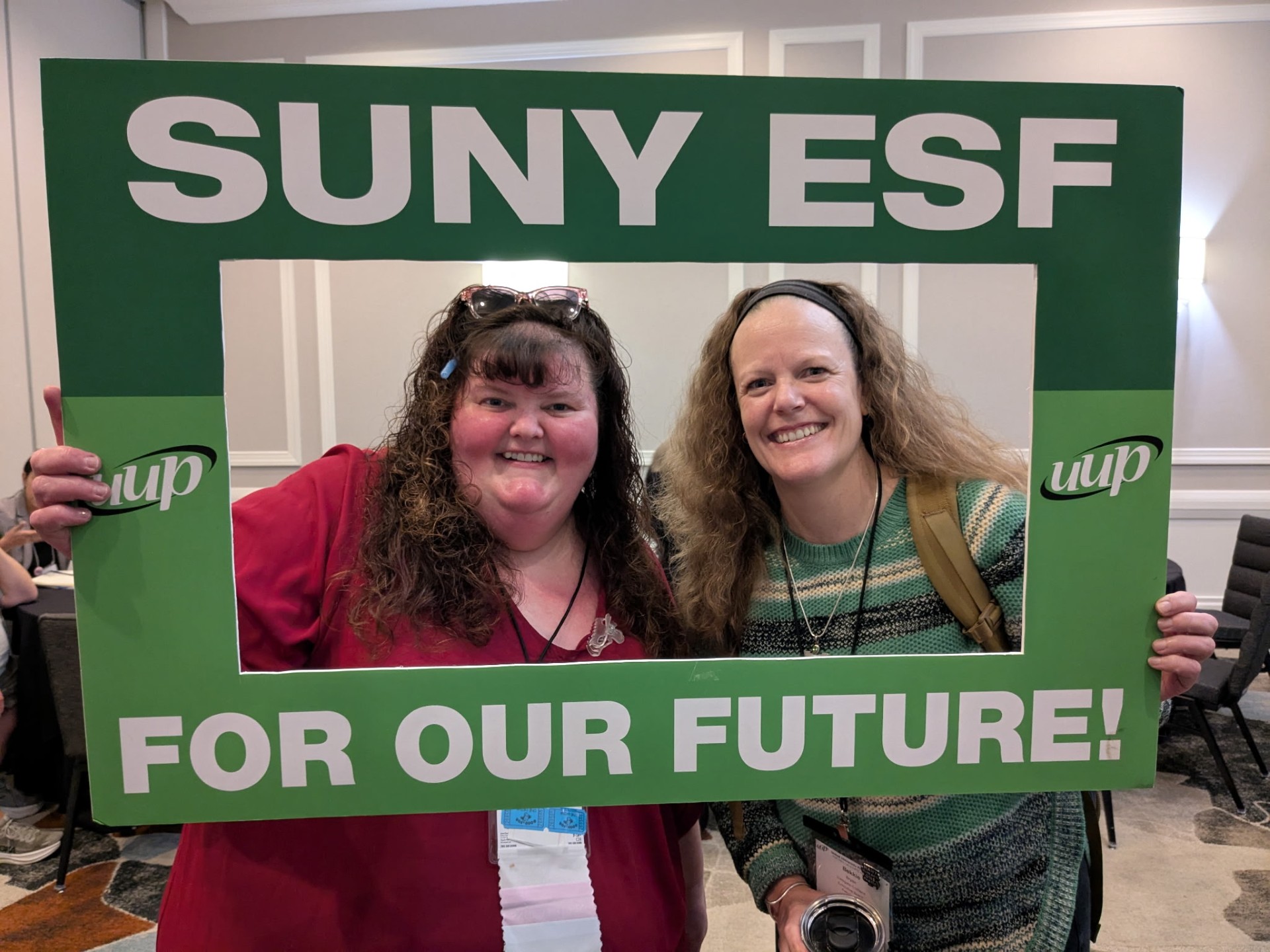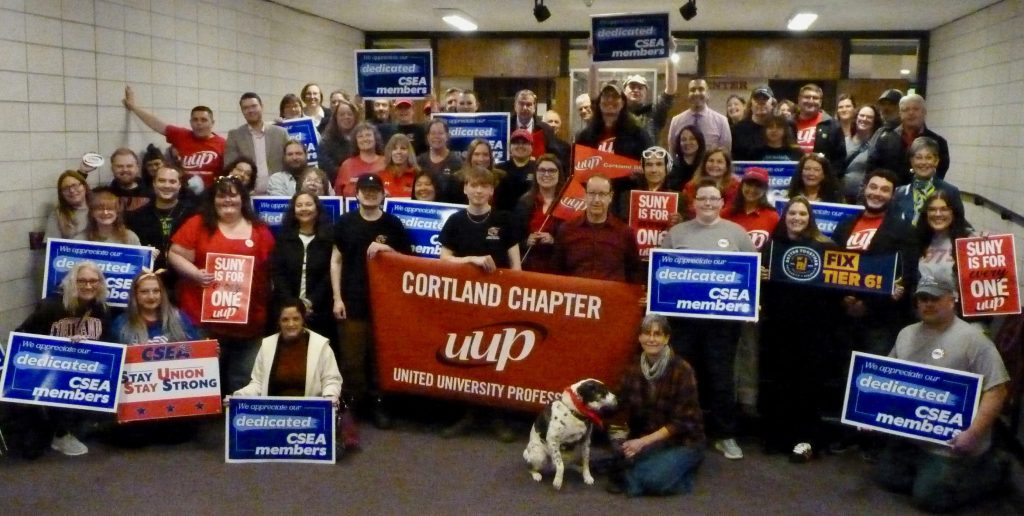
By Jaclyn Pittsley, President –
The COVID-19 global pandemic crisis continues. SUNY Cortland is not immune from the effects that this health crisis has had on our citizenry. Not only our community but the country and world itself are divided about how to fight this disease and what issues we should prioritize; and as this division continues, many of those we love the most are losing their lives. I don’t pretend to know how to solve all of our problems, but I am working hard to grasp the tentacles of this slippery problem here at Cortland.
The entire SUNY system is facing an unprecedented budgetary and enrollment crisis. Cortland in particular is facing a 14% enrollment decline, which, nonetheless, means our campus has the second highest projected enrollment numbers in SUNY for 2021. Still, we have less money than we need to operate optimally. The state has not as yet followed through with allocated revenue to higher education, including Cortland. The Cortland campus has had to return much-needed revenue, rightly, to students who had been asked to go home or study in place in spring 2020 and fall 2020. The state has also failed to provide detailed and comprehensive guidance in as timely a fashion as campuses have needed to manage the ongoing crisis. Your union is studying the fall semester to determine what could have been done differently and for whom. We hope for the best and prepare for the worst. We invest unprecedented amounts of time and devise new strategies. And we wait. We wait with baited breath to discover if our careful planning as an institution will result in having none, few, or several “Study in Place” periods during the spring 2021 semester. We wait to see just how long the state will defer our contractually agreed-upon raises, and we wait to hear about the status of grievances UUP has filed as a result of this deferment.
Over fifty of our most vulnerable part-time professionals and academics have lost their positions. Part-time professionals, often those serving as part-time assistant coaches, have lost the opportunity to participate fully in the careers they love, as caution has demanded the suspension of our athletics programming almost entirely for the fall semester and winter session. Part-time academics face the entire loss or a reduction in number of courses taught. Both situations are causing these members to be ineligible for health insurance, the long-lauded New York State benefit which is meant to off-set the meager salaries they earn. The fear and stress this uncertainty causes is appalling, especially for those trying to provide for their children and families. It is critically important that our sisters and brothers are supported in every way that UUP can, so they can continue to receive the benefits they are counting on for their health and survival.
For those facing this loss, UUP has provided informational open houses to our members facing this loss about available options, including applying for unemployment and other programs. UUP is also working hard with members of Cortland’s Management to help as many of these folks as possible to bring their full-time equivalent to the point that they are once again eligible for health insurance. Management has been open to consideration of any and all of the ideas brought forth by UUP leadership, including VRWS, a Resolution on Mutual Aid, and re-deployment. And management has generated ideas of their own, in what I suggest is unprecedented collaboration to support the jobs of all UUP represented employees. These ideas include working at the COVID-19 testing center, working as a re-deployed employee, and working at Quarantine and Isolation Activities. These opportunities are available if the UUP represented member is willing to be re-deployed, but no one should be pressured or mandated to participate. It may sound trite, but I truly believe that we can only succeed as a union and as a public higher education institution if we are all working together, all engaged, all active. Here at Cortland we are working hard to accomplish these goals.
I truly feel that my varied experiences have allowed me to empathize with the feelings and position of those who are suffering in their careers and at home right now; and I assure you that empathy is my guide as UUP works to protect the terms and conditions of employment of members, to understand – though not always to agree – with the difficult decisions Management is making, and to hope that somewhere, UUP will be on the side of inclusion in our strategy to combat the global pandemic and its cascade of resultant hardship.
As a reader, writer, thinker, and teacher of writing, I can perhaps illustrate what I am feeling and the empathy that guides me every day by drawing upon that medium through which I reach my students, literature. One short story provides a lesson for an issue I see on our campus. I want to talk to you about The Sneetches and Other Stories by Dr. Seuss. Published in 1953, the inimitable children’s story tells of a community of bird-like creatures who segregate themselves based upon whether or not they have a star imprinted upon their bellies. Those who do have a star, the Sneetches, have no empathy, sympathy, or any feelings at all really, for those with no star. In the 1973 film version of the movie, one star-bellied mother lectures her son as he is about to encounter a plain-bellied peer, “Ronald, remember, when you are out walking, you walk past a sneetch of that type without talking.” This sort of separation among our members, and the institution, can only divide us and destroy us. For me, the part-time faculty cannot be divorced from the full-time faculty, or our academic members from our professional members, or even our administration from our faculty. No one on this campus is thought inferior by me or by those very peers with whom we work. Every person is important, and every member matters.
In the story, it takes a criminal in the form of Sylvester McMonkey McBean, a man who brings to the Sneetches a magical machine that will imprint a star upon the belly of a sneetch, for a nominal fee, to open the eyes of the Sneetch community. The Sneetches are running back and forth between the Star Imprinting machine and the Star Removing machine, handing over all of their hard-earned, though perhaps meager money, to McBean. He thanks them for allowing him to exploit their weakness, for it is a weakness to be exclusionary. In this time of pandemic, in this time of attack on higher education, SUNY Cortland and UUP cannot afford to be exclusionary, as some may argue our governor or the federal leadership, our McBeans, have done. We cannot allow McBean and his contemporaries to divide us over this pandemic and thus defeat public higher education in New York State.
When the Sneetches have spent all of their money, and there is none more to be had, McBean packs up his machine, and says to himself as he drives away, “No, you just can’t teach a Sneetch.” Left in the aftermath of their furor of spending, the Sneetches are bewildered, confused, and ashamed. Those with stars have spent all they have to make certain those without stars remain identified and ostracized, while those without stars have tried to force their belonging by participating in the damaging ritual of having a star forcibly attached to their person. In doing so, they have blinded themselves to what is ultimately much more important – that the only one is who is worthy of censure is the one who should have led. The state and federal leadership has left each campus, each person, to fend for themselves alone. Instead of leadership, they have presented a star that, while immediately alleviating perhaps, has not also dealt with what really needs to happen. Money and stuff divide our communities; communication and collaboration can save them.
In the story, when the Sneetches finally stop and really look at each other, they can see “neither the Plain nor the Star-Bellies knew whether this one was that one… or that one was this one… or which one was what one… or what one was who.” Perhaps beleaguered but now wise, the Sneetches finally recognize and admit that identifying themselves for the purposes of differentiation and different treatment, for the purposes of fueling inequity, is purposeless and self-defeating. They can see there was no reason to discourage inclusion in the first place. I hope we at SUNY Cortland, in the Cortland community, and in United University Professions, we can realize the same. For though we may come from different places and have different titles, we may have taken different paths to arrive at where we are today, we are all human, we are all SUNY Cortland, we all love educating our students, we are all at risk, and we are all in this together.
If you can help, help. If you need to reach out, do. We are all a part of the great legacy of SUNY Cortland, and we are all necessary for this society to continue to function well. Therefore, I am calling on everyone, contingent and tenured faculty and professionals, their brothers and sisters in union working in a permanent or continuing appointment position, members or Management, students, labor coalitions, and community members to speak out, to recognize that we are not different, are all professional, are a part of this community, and we should be recognized as such, that we have to work together to preserve each other, and finally, act as models for our students and demonstrate the kind of inclusion that must sweep our nation in order for it to survive.





